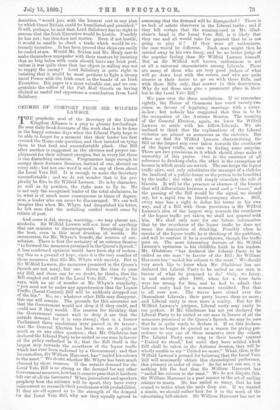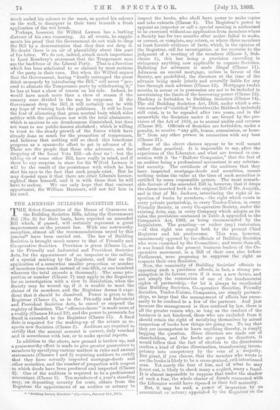CRUMBS OF COMFORT FROM SIR WILFRID LAWSON.
THEprophetic soul of the Secretary of the United Kingdom Alliance is a prey to gloomy forebodings. He sees daily fresh forecasts of the work that is to be done in the happy autumn days when the Liberal Party hope to be able to forget for a moment that their leader has first created the Home-rule question, and then insisted on tying them to that frail and uncomfortable plank. One Bill after another is suggested as the obvious and proper em- ployment for their released energies, but in every list there is one disturbing omission. Programmes large enough to occupy three Autumn Sessions, instead of one, abound on every side; but not one word is said in any of them about the Local Veto Bill. It is enough to make the Secretary uncomfortable ; and we do not wonder that in his per- plexity he flies to Sir Wilfrid Lawson. He is by character, as well as by position, the right man to fly to. He is not only the recognised leader of the total abstainers, he is, what is of much more consequence in times of depres- sion, a leader who can never be discouraged. We can well imagine that when Mr. Whyte had despatched his letter, he felt sure that the unfailing cordial would come by return of post.
And come it did, strong, warming,—we may almost say, alcoholic. Sir Wilfrid Lawson will ILA hear of anything that can minister to discouragement. Everything is for the best, even in this most drunken of worlds. Ho enumerates, for Mr. Whyte's benefit, the sources of con- solation. There is first the certainty of an autumn Session " to forward the measures promised in the Queen's Speech." A less confirmed optimist would have peen shy of reckon- ing this as a ground of hope, since it is the very number of these measures that fills Mr. Whyte with anxiety. But to Sir Wilfrid Lawson, the measures promised in the Queen's Speech are not many, but one. Given the time to pass any Bill, and there can be no doubt, he thinks, that the Bill singled out will be the Local Veto Bill. " Surely," he says, with an air of wonder at Mr. Whyte's simplicity, " you need not be under any apprehension that the Liquor Traffic (Local Control) Bill will be suddenly dropped out of the list." No, no ; whatever other Bills may disappear, this one will remain. The grounds for this assurance are that the Government would not drop it if they could, and could not if they would. His reasons for thinking that the Government cannot wish to drop it are that the outside demand for it is very strong ; that in a, former Parliament three resolutions were passed in its favour ; that the General Election has been won on it quite as much as on any other question ; that Mr. Gladstone has declared the Liberal Party to be united as one man in favour of the policy embodied in it ; that the Bill itself is the largest step towards the overthrow of the liquor traffic which has ever been endorsed by a Government ; and that its custodian, Sir William Harcourt, has " nailed his colours to the mast." We doubt whether Mr. Whyte has been much cheered by these reasons. If the outside demand for the Local Veto Bill is as strong as the demand for any other Government measure, how has it come to pass that it has been 'left out of all the forecasts ? When journalists and speakers prophesy how the autumn will be spent, they have every inducement to reconcile their predictions with probabilities. If they are all agreed as to the strength of the demand for the Local Veto Bill, why are they equally agreed in assuming that the demand will be disregarded ? There is no lack of astute observers in the Liberal ranks ; and if they felt certain that the winning-card in Mr. Glad- stone's hand is the Local Veto Bill, is it likely that they one and all would take for granted that he is not going to play it ? If they were all enthusiasts, the case would be different. Each man might then be carried away by his own fancy, and be no better judge of the popular feeling than Sir Wilfrid Lawson himself. But as Sir Wilfrid well knows, enthusiasm is not at all a, universal characteristic among Liberals. There are many of them who are very good judges of what will go down best with the voters, and who are quite sincere in their desire to go on with those Bills, and with those Bills only, that answer to this description. Why do not these men give a prominent place in their list to the Local Veto Bill ?
We pass over the three resolutions. If we remember rightly, the House of Commons has voted twenty-two times in favour of legalising marriage with a sister- in-law ; but nobody has suggested that this is to be the occupation of the Autumn Session. The meaning of the General Election, again, we leave Sir Wilfrid Lawson to settle with his fellow-Liberals. We are inclined to think that the explanations of the Liberal victories are almost as numerous as the victories. But when we find Sir Wilfrid Lawson characterising the Bill as the largest step ever taken towards the overthrow of the liquor traffic, we' own to feeling some surprise. There are two provisions in it which should alone make it unworthy of this praise. One is the omission of all reference to drinking-clubs, the other is the exemption of houses in which meals are served. The one keeps the liquor traffic alive, and only substitutes the manager of a club for the landlord of a public-house as the person to be benefited by the traffic ; the other will simply stimulate the sale of biscuits. It will be the presence or absence of the biscuit that will differentiate between a, meal and a " booze," and the passing of the Bill would be the signal, we should say, for a rapid rise in biscuit-company shares. Still, every man has a right to define his terms in his own way, and if a Bill with these provisions is Sir Wilfrid Lawson's idea of the largest step towards the overthrow of the liquor traffic yet taken, we shall not quarrel with him. We shall only note for our future information that by the overthrow of the liquor traffic he does not mean the diminution of drinking. Possibly when he speaks of the liquor traffic he is thinking of the publican, and will be content if he is overthrown, though the traffic goes on. The most interesting feature of Sir Wilfrid Lawson's optimism is his childlike faith in his leaders. Mr. Gladstone " has declared the Liberal Party to be united as one man " in favour of the Bill ; Sir William Harcourt has " nailed his colours to the mast." We should very much like to know when Mr. Gladstone has not declared the Liberal Party to be united as one man in favour of what he proposed to do I Only, we fancy, in and shortly after 1886, when for a time facts were too strong for him, and he had to admit that Liberal unity had for a moment vanished. But that is all over now. The waves have closed over the Dissentient Liberals ; their party knows them no more ; and Liberal unity is once more a reality. But for Sir Wilfrid Lawson's purpose, Liberal unity may easily be too perfect. If Mr. Gladstone has not yet declared the Liberal Party to be united as one man in favour of all the measures promised in the Queen's Speech, we may be sure that he is quite ready to declare it. If so, this declara- tion can no longer be quoted as a reason for giving pre- cedence to any one of these measures over the others. The Liberal Party may sing to their hearts' content "United we stand," but until they have settled which Bill shall be taken in the Autumn Session, they will be wholly unable to say " United we move." What, then, is Sir Wilfrid Lawson's ground for believing that the Local Veto Bill will necessarily obtain this chronological preference, this primacy in order of time ? So far as we can see, it is nothing but the fact that Sir William Harcourt has "nailed his colours to the mast." We do not dispute this. Sir William Harcourt is a past master in the art of nailing colours to masts. He has nailed so many, that he has ceased to notice when the nails drop out. If we wanted a simile, we should rather look for it in the work of the advertising bill-sticker. Sir William Harcourt has not so much nailed his colours to the mast, as pasted his colours on the wall, to disappear in their turn beneath a fresh application of the wet brush. Perhaps, however, Sir Wilfrid Lawson has a lurking distrust of his own reasoning. At all events, he supple. ments his proof that the Government do not wish to drop the Bill by a demonstration that they dare not drop it. No doubt there is an air of plausibility about this part of his letter. We do not, indeed, attach much importance to Lord Rosebery's statement that the Temperance men are the backbone of the Liberal Party. That is a function which has been attributed to or claimed by most sections of the party, in their turn. But when Sir Wilfrid argues that the Government, having "finally estranged the great drink monopoly by introducing the Bill," will never " pro- ceed to alienate the Temperance party by withdrawing it," he has at least a show of reason on his side. Indeed, he would have much more than a show of reason if the country were divided in the way he supposes. If the Government drop the Bill, it will certainly not be with any hope of winning back the publicans. It will be from the fear of alienating that great neutral body which sides neither with the publicans nor with the total abstainers ; which is anxious to see drunkenness diminished, but does not want to see public-houses abolished; which is willing to trust to the steady growth of the forces which have already done so much for the promotion of temperance, and believes that nothing will so check this beneficent progress as a spasmodic effort to get in advance of it. These are the people that those who advocate, not the dropping of the Local Veto Bill—oh dear no !—but the taking up of some other Bill, have really in mind, and if there be any surprise in store for Sir Wilfrid Lawson it will be the result of the persistence with which he has shut his eyes to the fact that such people exist. But he may depend upon it that there are other Liberals keener- sighted than himself, and it is with these that he will have to reckon. We can only hope that that eminent opportunist, Sir William Harcourt, will not fail him in his need.



































 Previous page
Previous page